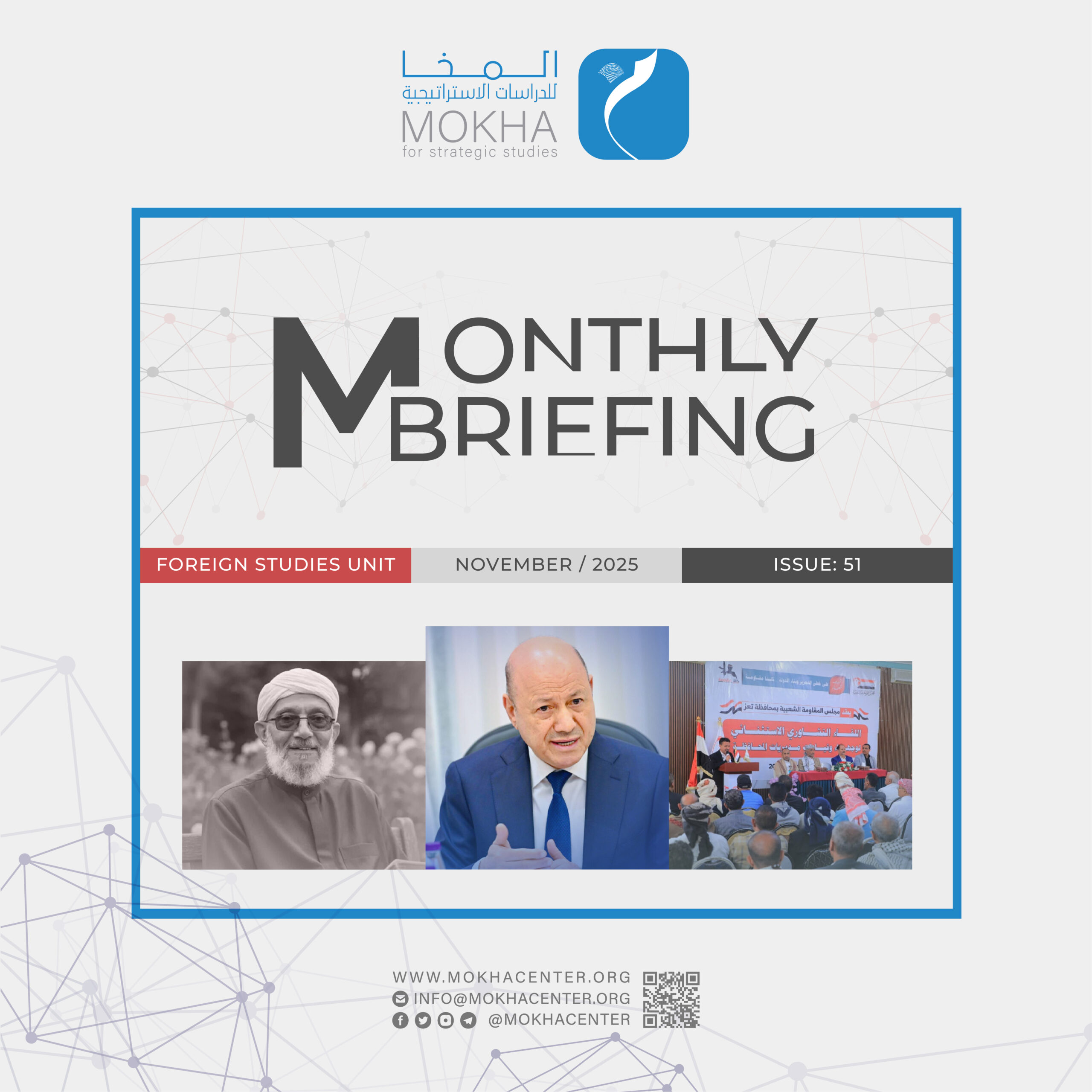Monthly Briefing /November– 2024

Political scene
Yemen’s political situation has seen major changes, marked by rising tensions in the Red Sea due to Houthi attacks on both commercial and military ships. At the same time, diplomatic initiatives are progressing to push forward the signing of the UN roadmap, while military activities suggest the possibility of a renewed conflict.
-
- A report by the UN Panel of Experts, confirmed that the Houthis have deepened their collaboration with Iran and Hezbollah, receiving both military and financial support. The report also highlighted extensive violations of international law in the Red Sea and the Gulf of Aden. November 1
- The UAE-backed Southern Transitional Council (STC) rejected the outcomes of the “National Bloc of Political Parties and Components” announced in Aden. While reaffirming its commitment to the “Riyadh Agreement,” the STC emphasized its differing stance, advocating for the secession of the south. November 6
- UN envoy to Yemen, Hans Grundberg, held discussions with senior Omani officials and Houthi representative Mohammed Abdul Salam in Muscat, the Omani capital. The talks focused on the immediate release of over 70 UN employees kidnapped in Sana’a. November 12
- The UN Security Council voted to extend sanctions against individuals threatening peace in Yemen until November 15, 2025, and to prolong the mandate of the Panel of Experts until December 15, 2025. November 13
- Germany expressed its concern over the escalating Houthi attacks in the Red Sea and Gulf of Aden, warning that these actions pose a serious threat to international shipping and critical global trade routes, including the Suez Canal. November 16
- Aidarous al-Zubaidi, a member of the Presidential Leadership Council and leader of the Southern Transitional Council, met with Russian Deputy Foreign Minister Mikhail Bogdanov in Abu Dhabi to discuss efforts to advance peace in Yemen. November 16
- US envoy to Yemen Tim Lenderking stated that the Houthis are hindering peace efforts by targeting commercial ships in the Red Sea, which has disrupted the regional economy. November 17
- The Yemeni government announced the launch of wide-ranging reforms aimed at restructuring institutions, reforming wages and employment systems, enhancing capacity building, and advancing digital transformation. November 18
- The “Ma’rib Comprehensive Conference” announced the formation of its supreme body and elected Abdulhaq Al-Qabli Nimran as president of its first session. The conference emphasized the importance of uniting national ranks to support legitimacy and bring an end to the Houthi coup. November 18
- In a joint statement issued after a meeting in Riyadh, Saudi Arabia, Iran, and China reaffirmed their commitment to implementing the “Beijing Agreement” and expressed support for a political solution in Yemen, emphasizing the importance of respecting the sovereignty of nations. November 19
- The UN Security Council reiterated its call for the Houthi group to release the crew of the ship Galaxy Leander and to cease attacks on commercial vessels in the Red Sea and the Gulf of Aden. November 19
- Sweden announced that it would end its development aid to Yemen, citing the Houthis’ kidnapping of UN employees and the deteriorating security situation. The decision will affect northern Yemen by 2024 and southern regions by 2025. November 25
- Saudi Ambassador to Yemen Mohammed Al Jaber met with US envoy Tim Lenderking and US Ambassador Stephen Fagin to discuss developments in Yemen and the Red Sea, as well as strategies to support stability and achieve a comprehensive political solution. November 25
- The Hadhramaut Tribal Alliance and the Hadhramaut Comprehensive Conference declared that they would cease dealings with the Presidential Leadership Council, accusing it of neglecting Yemen’s urgent issues. November 28
Rashad Al-Alimi, Chairman of the Presidential Leadership Council, arrived in Abu Dhabi on an official visit to discuss Yemen’s developments and strengthen bilateral relations with the UAE. November 29
The military escalation persists with Houthi attacks on commercial ships in the Red Sea, along with limited clashes on the Marib and Taiz fronts. The Houthis are also intensifying their military mobilization, particularly in light of the escalating events in Syria. The UAE Ministry of Defense announced the death of First Sergeant Mohammed Atiq Al-Khaili, who succumbed to injuries sustained during Operation Decisive Storm in 2015 as part of the Yemen conflict. November 28
The United States imposed new sanctions targeting entities and individuals associated with the Iranian Revolutionary Guard and the Houthis. Reports also revealed that the Houthis are smuggling Yemeni youth to Russia to recruit them for combat in Ukraine. The Aden Public Prosecution issued an arrest warrant for Ali Muhammad Al-Saya, accused of leading a gang responsible for assassinations and bombings. Investigations uncovered Al-Saya’s direct involvement in these crimes. He previously served as Deputy for Intelligence Affairs in the Counter-Terrorism Service, headed by Major General Shallal Shaya. November 25
Military scene
Security Scene:
Economic Scene:
- the World Bank warned of a deepening humanitarian and economic crisis in Yemen caused by ongoing conflict and political fragmentation. The Yemeni economy is projected to contract by 1% in 2024, amid declining government revenues and worsening living conditions. November 1
The United Nations reported that the Yemeni currency had lost 25% of its value in government-controlled areas over the past year and 36% over the past three years. This depreciation has driven up food and fuel prices, exacerbating the economic hardship faced by Yemenis. November 6
Violations and Rights:
-
- The Houthi group placed a siege on the homes of the family of the late Sheikh Abdullah bin Hussein Al-Ahmar in Sana’a, preparing to confiscate the property. The operation involved the women’s police and rapid intervention forces. November 3
- The American Center for Justice condemned the detention of six doctors from Sana’a by the “Transitional Council” forces in Aden on October 25. They were arrested while attempting to receive medical supplies. November 5
- Soldier Muhammad Suleiman, who had been imprisoned by the Houthis since 2020, died due to severe torture at the Central Security Prison in Sana’a. November 10
The American Center for Justice reported that Mohammed Hamoud Moharam, a young man, has been forcibly disappeared in Aden by the “Transitional Council” forces for over seven years, without trial or formal charges, and his fate remains unknown. November 11
Humanitarian Scene:
Yemen is facing a worsening humanitarian crisis in 2024, with escalating hunger, the deprivation of education for 8 million children, and deteriorating health conditions, including the spread of measles and cholera. Displacement continues, and basic services are collapsing.
- A report revealed that heavy rains in Yemen throughout 2024 caused floods, resulting in the deaths of 240 people, 635 injuries, and the displacement of 655,000 individuals. November 15
- According to a UN report, the hunger crisis in Yemen has worsened, with the country ranking second in the Global Hunger Index for 2024. The displaced population is suffering immensely, with food deprivation rates reaching 36% in September. November 19
- The International Organization for Migration reported that the ongoing conflict in Yemen has left 2.4 million children out of school, with another million dropping out. Over 2,000 schools have been damaged, and an estimated 8 million children, including 1 million displaced, may lose access to education. November 20
- The World Health Organization announced that since the beginning of 2024, Yemen has registered 33,000 suspected cases of measles, resulting in 280 deaths. In addition, 204,000 cholera cases have been reported, with 710 deaths. November 27
The International Organization for Migration announced that approximately 20,000 people have been displaced in Yemen since the beginning of 2024. These individuals are spread across 3,297 displaced families, with 59 families displaced during the past week. Additionally, 61 families were added to the overall cumulative displacement total. November 28
Statistics
Infographic Outline:
- Title: Yemen Displacement and Migration Data (October 2024)
- Section 1: Displacement to Marib Governorate
- Total displaced: 146 families, 876 individuals
- Movement due to economic conditions: Dozens of families relocated from rented homes to camps
- Total displaced since January 2024: 1,326 families
- Section 2: African Migration to Yemen
- Total African migrants: 6,364 (136% increase from September)
- Countries of origin: Primarily Djibouti and Somalia
- Settlement area: Shabwa Governorate
- Section 3: Yemenis Returning Home
- Yemenis who returned: 3,448
- Section 4: Migrants Deported from Oman
Total deported: 172 migrants

